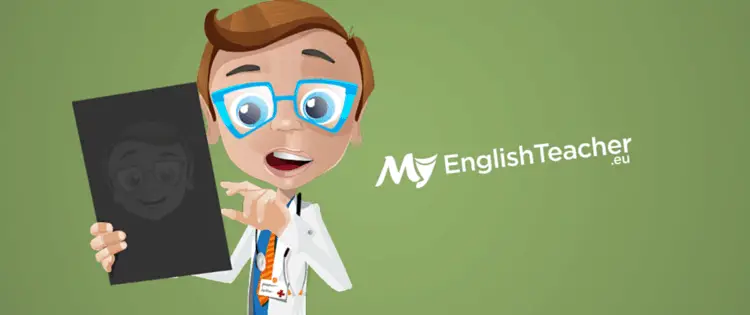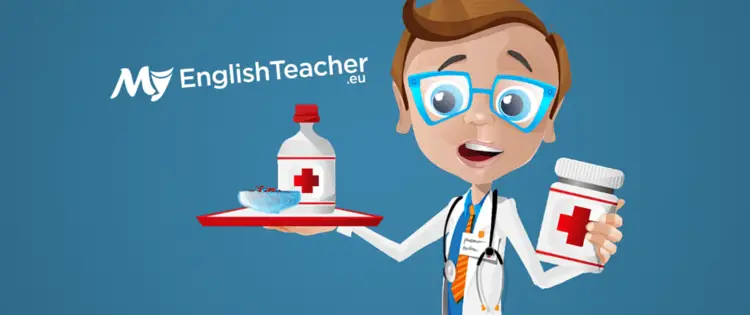1

2
3

4
Активна лексика: tablets, pills, drugs, a cough syrup/drops/mixture, a nasal spray, vitamins, eye drops, painkillers, antibiotics, sleeping pills; an ointment, a heating pad, an ice pack; doctors, dietician, optician, surgeon, internist.
Symptoms & Illnesses Vocabulary
AT THE DOCTOR Dialogues and Vocabulary List
Image Source
You can jump to any section of this article:
- Health, Illness and Disease Vocabulary
- Illness Expressions
- Common Illnesses and Diseases in English
- Medicine, Medical Equipments and Tools
- Medical Specialists List
- What to say at the doctor?
- Doctor’s Questions and Answers to Patient
- Patient Symptoms
- At the dentist’s
- At the chemist’s
Health, Illness and Disease Vocabulary
painfeeling in your body when you have been hurt or when you are ill,sick
- Suddenly she felt a sharp pain in her neck, shoulder, waist, arm, leg, stomach.
- Take an aspirin to relieve the pain.
continuous pain; feel a continuous pain
- I can’t sleep because my head aches too bad.
- I have a terrible headache, backache, stomach-ache.
suffering from an illness or disease; not feeling well; sick
- My elder sister is seriously ill in St John’s hospital.
- The children started to feel ill an hour after the meal.
physically or mentally ill; wanting to vomit
- I feel very sick, I don’t think I can work today.
- Be careful with the cake, too much of it can make you sick.
painful (and often red) because of infection or because a muscle has been used too much
- I have a sore throat, I mustn’t take that cold drink.
- She says her stomach is still sore after the operation.
- His feet were sore after the bicycle trip.
the state of being physically or mentally ill
- Our secretary missed a lot of work through illness last month.
- Flu can be a serious illness if you aren’t careful enough.
serious illness, often caused by infection
- Peter’s uncle suffers from a rare blood disease.
- A fatty diet increases the risk of heart disease.
- The government is planning further health measures to prevent the spread of disease.
become healthy again; make something, somebody healthy again, make somebody feel happy again
- As I see it will take a long time for your wounds to heal.
- This ointment will help to heal your scratches.
- The tea you made really healed me.
make somebody or something healthy again after an illness; make an illness go away
- He was seriously ill for a long time, but the doctor cured him at last.
- Scarlet fever is a serious illness, but it can be cured fairly fast.
medicine or medical treatment that cures an illness; the act of curing or the process of being cured
- There is no known cure for this illness but the it can be treated.
- I’m afraid you must be taken to hospital for the cure.
give medical care or attention to somebody or something; deal with something or somebody
- I was treated for flu, but later I was diagnosed with pneumonia.
- This illness is usually treated with antibiotics and a strict diet..
(the way or process of) curing an illness or injury or making somebody look and feel good; the way of dealing with something or somebody
- Doctors apply various treatments for this illness.
- My sister goes to a wellness centre to receive beauty treatments.
define what an illness or the cause of a problem is
- The blood test is used to diagnose all kinds of diseases.
- She was diagnosed (as) (a) diabetic in her early childhood.
medical description of an illness or condition
- The doctors didn’t share every detail of the diagnosis with the patient’s family.
- We had to wait a lot for the exact diagnosis after the examination.
harm done to the body, for example in an accident
- They were lucky to escape the fight without serious injuries.
- There were only minor injuries in the crash.
- Recommended for you:
injure
harm somebody or yourself physically, especially in an accident, receive/suffer an injury
- He injured his finger when he was cutting the meat.
- Nobody was killed in the accident, but two people were seriously injured.
an injury to part of the body, especially one in which a hole is made in the skin
- He died from the wounds that he had received in the crash.
- He was taken to hospital although his wounds didn’t seem too serious.
a wound caused by something sharp
- He had such a deep cut on his arm that he was taken to hospital.
- The victim had several cuts on his chest, still he survived.
a blue, brown or purple mark on the skin after somebody has fallen
- He was covered in bruises at the end of the football match.
- The man came to the surgery with a huge bruise over his eye.
rub your skin with your nails, usually because it’s itching; a mark or a small cut or injury made by scratching
- The cat continuously scratched itself behind the ear.
- She had a long scratch on her arm when she came out of the rose garden.
illness caused by bacteria or a virus; the act or process of causing or getting a disease
- Wash your hands carefully to decrease the risk of infection.
- She almost died from blood infection.
a condition when a part of the body becomes red, sore and swollen because of infection or injury
- My knee was twice the size of the other one due to the inflammation.
- You had better not eat fatty food so soon after your stomach inflammation.
a change in your body or mind that shows that you are not healthy
- You don’t necessarily need a doctor with symptoms like a headache or sore throat.
- Depression can cause physical symptoms, too.
the measurement of how hot your body is
- have a temperature – when your temperature is higher than normal due to illness
- I feel so weak, I think I have a temperature.
- She had such a high temperature that she was immediately taken to hospital.
a medical condition in which someone has a temperature that is higher than normal; a particular type of disease with high temperature
- Did you take aspirin to reduce the fever?
- Our daughter has been diagnosed with scarlet fever.
illness affecting the nose and/or throat, making you cough and/or sneeze
- I think I caught a cold on the ice rink yesterday.
- She can’t come to school, she’s in bed with a cold.
a very bad cold, an infectious disease with fever, pains and weakness
- Please don’t visit us this week, the whole family has the flu.
- If you’re not careful enough and you don’t take antibiotics, you may even die from the flu.
discharge stomach contents through the mouth
- There must have been something wrong with the food as both children vomitedshortly after the meal.
- I’m afraid I’m pregnant; I vomit after getting up every morning.
a substance that you drink or swallow so as to cure an illness
- You look so pale. Haven’t you taken your medicine this morning?
- The doctor prescribed three kinds of medicine for me.
medicine that kills bacteria and cures infections
- My mum’s throat infection went away after she started the antibiotics.
- Hot tea won’t be enough to cure your flu, I think you also need antibiotics.
kind of medicine that takes away some or all of the discomfort of an illness or injury
- I had such a horrible headache last night that I took two pain killers.
- She says she doesn’t think it’s a good idea to take pain killers too often.
the rate at which blood flows through the body
- Drink some coffee if you feel your blood pressure is too low.
- High blood pressure increases the risk of having a heart attack.
the regular beat of blood as it is sent around the body
- The doctor started the examination with taking my pulse and blood pressure.
- He has such a weak pulse that it’s hard to feel.
a photograph of a somebody’s bones and organs
- They took x-rays of my knee to make sure it wasn’t broken.
- The doctor says that the x-ray has proved his suspicion of cancer, but I don’t believe him.
a person staying in a hospital or medical facility
- The doctor examined the patient very carefully but he didn’t find any disorder.
- There were so many patients in the doctor’s surgery that I didn’t wait and I went home.
a place where a doctor or dentist sees patients; medical treatment of injuries or diseases involving cutting open somebody’s body
- I wanted to see a doctor but the surgery was closed.
- I hope they can cure me with medicine and I don’t need undergo surgery.
cutting open a part of somebody’s body in order to remove or cure a part
- The operation was successful but the patient died.
- The doctor says I can hardly escape an operation.
cut open a part of somebody’s body in order to remove or cure a part
- He soon recovered after he was operated on for appendicitis.
- The doctor ordered to take my brother to hospital and they will operate on himtomorrow.
a room in a hospital used for medical operations
- The patient died on the way to the operating theatre.
- She felt nervous as she looked round the operating theatre.
a shop where medicine is sold
- The doctor suggested to go to the chemist’s for the medicine straight from the surgery.
- This syrup is also sold in the supermarket, so you don’t need to go to the chemist’s.
an official piece of paper filled out by a doctor with which you can get medicine from a chemist’s shop
- Unfortunately, the doctor forgot to sign the prescription and so the chemist refused to give me the medicine.
- Keep this prescription even though you don’t need the medicine now; you may need it later.
Recommended for you:
 |
| explain, illustrate, clarify, make clear, describe, teach, point up, demonstrate, put in other words |
Illness expressions
- feel ill, sick
- have a temperature
- have a pain in your back, chest, waist, arm, shoulder
- have a headache
- feel weak
- feel dizzy
- suffer from stomach cramps
- have a black eye
- have a swollen, sprained ankle, wrist, foot
- have a lump
- have a broken leg
- have a fracture
- burn, cut a finger
- sprain an ankle
- be allergic to antibiotics
- produce an allergic reaction
- come down with a cold
- be in bed with a cold
- have a heart attack, stroke
- suffer from asthma, malnutrition, diabetes
- fight cancer, depression, addiction, alcoholism
- (go to) see a doctor
- examine a patient
- take, feel your pulse
- take, measure your temperature
- diagnose an illness, disease
- diagnose a condition, disorder
- prescribe medicine
- make up a prescription
- take someone to hospital
- undergo an examination, operation
- dress a wound
- a bandaged arm, leg
- put on a plaster
- give an injection
- have a blood test
- prevent the spread of disease
- enhance, build immunity to a disease
Recommended for you:
 |
| illness, sickness, poor health, disease, sickness, weakness |
Common Illnesses and Diseases in English
- flu
- cold
- diarrhoea
- pneumonia
- mumps
- measles
- chickenpox
- scarlet fever
- tonsillitis
- bronchitis
- indigestion
- ulcer
- appendicitis
- hepatitis
- heart attack
- heart disease
- stroke
- arthritis
- asthma
- lung cancer
- diabetes
- amnesia
- nervous breakdown
Recommended for you:
 |
| doctor, medicine, medical equipments, drug, dose, pill, tablet, capsule |
Medicine, Medical Equipments and Tools
- pill
- tablet
- capsule
- syrup
- ointment
- cream
- eye drops
- injection
- tranquilizer
- pain-killer
- antiseptic
- antifebrile
- dressing
- bandage
- cast
- brace
- gauze
- plaster
- elastic tape
- thermometer
- stethoscope
- syringe, forceps, scissors, oxygen mask, test tube, vial, IV bag, blood pressure monitor, crutches, wheelchair
Recommended for you:
 |
| academic writing examples and phrases |
Medical Specialists List
Nurse: doctor’s assistantAllergist: treats food and environmental allergies
Anaesthesiologist: provides pain prevention during surgery
Cardiologist: heart specialist
Dentist: tooth specialist
Dermatologist: skin specialist
Gynecologist: specializes in women’s needs
Midwife: helps women deliver babies
Neurologist: brain specialist
Oncologist: tumour specialist
Ophthalmologist: deals with eye diseases
Pediatrician: treats babies and children
Physical therapist: specializes in the body’s movement
Psychiatrist: mental health specialist
Radiologist: specializes in imaging tests (x-ray, etc.)
- Recommended for you:
 |
| doctor, health, vitality, energy, good condition |
What to say at the doctor?
Going to Doctor- I think you should see a doctor.
- You look very pale. Shall I call the ambulance?
- I’m ill. I don’t feel well. I need a doctor. I must see a doctor.
- Doctor Bulb’s surgery hours are from 9 to 12 every morning.
- Where do I find the GP’s office? (general practitioner – a doctor who is trained in general medicine working in the local community)
- What are the consulting hours of the ENT (ear, nose and throat) specialist?
- Do I have to make an appointment?
- What’s the matter? Where’s the pain? What do you complain of?
- Have you taken your temperature?
- For how long have you been feeling ill?
- Take your clothes off. I’ll examine you. Let me take your pulse, please.
- I’ll measure your blood pressure.
- Your blood pressure is rather high. Your blood pressure is too low.
- Let me sound your back. Take a deep breath. I’ll check your lungs.
- Can I have a look? Where does it hurt?
- Does it hurt here? Breath out slowly.
- Show me your tongue. Poke out your tongue.
- Have you got any other symptoms?
- What infectious diseases have you had?
- What have you eaten/drunk?
- Have you been injured?
- Don’t worry. There’s no serious problem.
- I don’t think it’s too serious.
- You’ve got to be vaccinated against tetanus.
- You must stay in bed and take this medicine three times a day, after meals.
- I’ll dress the wound and put a plaster on your arm.
- You must follow a diet, you need to rest and you shouldn’t worry.
- Your test results have come in. The blood test came back negative.
- The biopsy shows a tumour.
- You should consult a specialist.
- We’ll know more in a few days.
- It would be better if you went to hospital.
- I think you’ll have to stay in hospital for a week.
- Hopefully, there won’t be any complications.
- I don’t think you need chemotherapy.
- I’ll give you a prescription. Take this medicine three times a day / after meals / an hour before lunch.
- You’ll soon be well again.
- Come back next week if you don’t feel better.
Recommended for you:
 |
| love, care for, adore, be in love with, heart, vital organ |
Patient Symptoms
- I’ve got a high temperature.
- I feel really rough. I’m shattered/exhausted.
- Could you check my blood pressure? I’ve got high blood pressure.
- There’s a sharp pain here. I’ve got a pain in my limbs.
- I feel dizzy. I’ve got a kidney problem. I’ve lost weight.
- I always feel bad after meals. I’ve got a stomach ache.
- I’ve got a splitting headache. I often have nosebleeds.
- I have diarrhoea. I’ve lost my appetite.
- I’ve got circulation problems. I sweat all night.
- My ears are buzzing. I’ve got an upset stomach.
- I’ve sprained my wrist/ankle. My hand/foot is badly swollen.
- I think I’ve pulled a muscle in my leg/arm.
- I’ve had scarlet fever, mumps, the measles.
- Is it something serious? Is this a common problem at my age?
- When will the tests results come in? Are you going to run more tests?
- Do I have to be operated on? Will I need surgery?
- How long do I have to stay in hospital?
- I hope there won’t be any complications.
- Could you prescribe some medicine for me?
- How often should I take this medicine?
- Shall I come back next week if I don’t get better?
- I’ve got a pain in my back teeth and my gum is bleeding.
- I’ve lost a filling. My denture’s broken.
- Does the tooth have to be extracted or can you replace the filling?
- Would you make up this prescription for me?
- Shake well before use. Not to be taken orally.
- Can I get a packet of vitamin tablets?
Recommended for you:





No comments:
Post a Comment